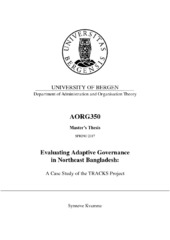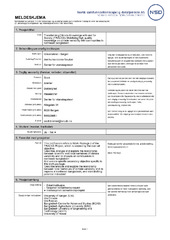| dc.description.abstract | In the face of accelerating environmental issues, such as climate change, new modes of governance have emerged. One such approach is that of adaptive governance, which can be seen as a critical challenge to the conventional top-down regimes of environmental management. Despite having received increased attention and influence over the last two decades, the aspect of evaluation of adaptive governance remains largely unexplored in the literature, and there is a lack of a consistent, agreed upon framework for evaluation. This study intends to contribute to fill this gap in the scholarship by drawing on existing evaluation efforts in the adaptive governance literature and adopting a participatory evaluation approach. Specifically, it evaluates how one particular initiative, the TRACKS research project (TRAnsforming Climate Knowledge with and for Society), contributed to two communities’ climate adaptation in northeast Bangladesh, using adaptive governance as a theoretical and evaluative lens. This thesis describes how a novel, capital based evaluation framework for adaptive governance was constructed and tested with the TRACKS project. The method used in this study was qualitative interviews with citizen scientists, conducted in three rounds during 2016 and 2017. The evaluation of the TRACKS project revealed a significant impact on the communities’ human and social capitals, and a weak to moderate impact on the resource and technology capital, the political capital, and the institutional capital. Despite room for improvement, the evaluation framework proved a useful tool for evaluation of adaptive governance, as it allows for achievements and shortcomings to be easily identified. Importantly, its participatory component allows for the framework to be tailored to different contexts, which suggests it might have potential in other settings as well. | en_US |

